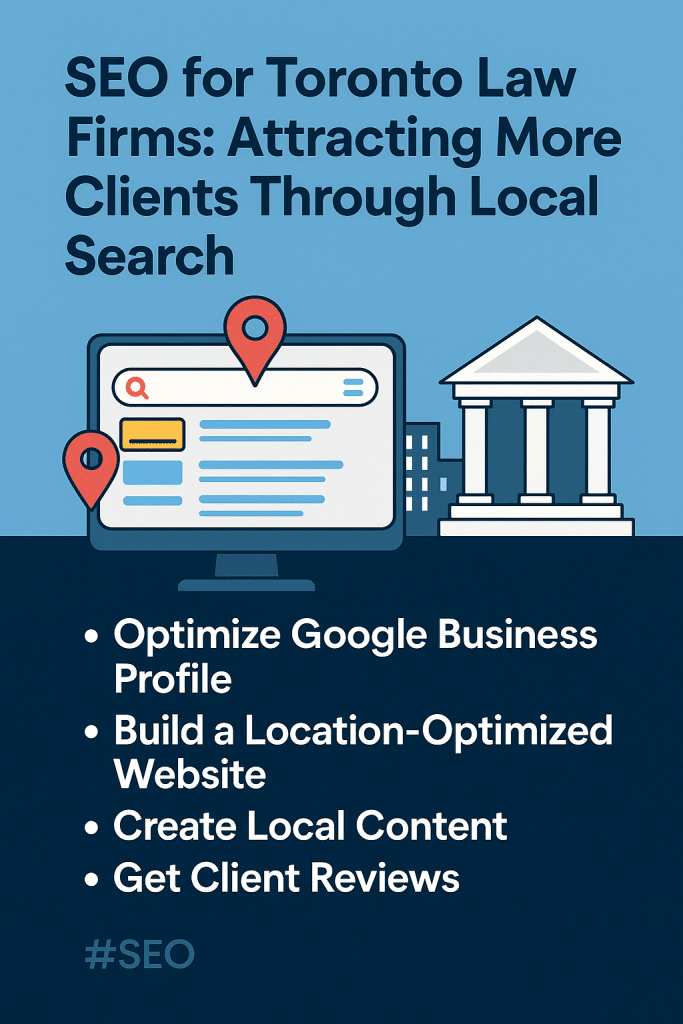Understanding the Importance of Local SEO for Law Firms in Toronto
Toronto’s legal industry is among the most competitive in Canada. Dozens of firms compete for visibility in practice areas such as personal injury, criminal defence, family law, real estate, and corporate law. With prospective clients increasingly turning to Google to find and vet legal professionals, optimizing for local SEO is no longer optional—it is a critical business growth strategy. Appearing at the top of search results for terms like “Toronto divorce lawyer” or “real estate lawyer near me” determines which firm gets the call.
How Local Search Drives Legal Client Acquisition
When a potential client searches online for legal help, their intent is immediate. They are not casually browsing; they are seeking representation or advice. Ranking prominently in Google’s Local Pack (map results) and organic listings gives law firms an advantage at the precise moment prospects are ready to contact a lawyer. A well-executed SEO strategy ensures your firm:
Appears in high-value searches with clear purchase intent.
Builds credibility by showing up consistently across directories and search engines.
Creates multiple touchpoints (website, Google Business Profile, reviews, content) that reinforce trust.
Core Components of SEO for Toronto Law Firms
1. Optimizing the Google Business Profile (GBP)
Your Google Business Profile is the foundation of local search visibility. To maximize performance:
Use the exact firm name as registered.
Add complete and consistent NAP (Name, Address, Phone Number).
Choose precise categories such as “Family Law Attorney” or “Personal Injury Lawyer”.
Upload professional photos of attorneys, staff, and your office.
Publish regular updates or announcements (case results, community involvement, blog posts).
Encourage satisfied clients to leave detailed 5-star reviews mentioning practice areas and “Toronto.”
2. Building a Location-Optimized Website
Search engines prioritize websites with local relevance. Toronto law firms should:
Include “Toronto” in page titles, meta descriptions, and H1 tags.
Create individual landing pages for each practice area + location (e.g., “Toronto Divorce Lawyer”, “Toronto Criminal Defence Lawyer”).
Add an embedded Google Map on the contact page.
Display the firm’s NAP in the footer of every page.
Ensure mobile responsiveness and fast load times.
3. Creating High-Value Legal Content
Clients research before contacting a lawyer. Publishing SEO-optimized blog articles helps attract visitors and establishes expertise. Effective content ideas include:
“How to File for Divorce in Ontario”
“What to Expect After a Car Accident in Toronto”
“Steps in a Real Estate Closing in Toronto”
“Criminal Charges in Ontario: A Complete Guide for Defendants”
Each post should integrate Toronto-specific keywords and link to related practice pages.
4. Local Link Building Strategies for Law Firms
Authoritative backlinks drive rankings. Toronto law firms can:
List in respected directories like the Law Society of Ontario, FindLaw Canada, and Justia.
Partner with Toronto organizations for sponsorships and get backlinks.
Contribute guest posts to Canadian business, real estate, or healthcare websites with legal tie-ins.
Issue press releases for significant case wins or firm expansions.
5. Online Reviews and Reputation Management
For law firms, reputation is everything. Reviews serve as social proof in search rankings. To maximize impact:
Request reviews after successfully closing a case.
Respond to all reviews—positive and negative—in a professional tone.
Showcase select testimonials on your website with schema markup.
Use review monitoring tools to maintain a strong online reputation.
Advanced SEO Strategies for Toronto Law Firms
6. Leveraging Legal Directories and Citations
Citations confirm the legitimacy of your practice. Law firms should ensure consistent information across:
Yelp, Yellow Pages Canada, and 411.ca
Legal directories such as Avvo, Lawyers.com, and LegalMatch
Local Toronto business directories and chambers of commerce websites
Consistency between citations strengthens Google’s trust in your firm’s legitimacy.
7. Technical SEO for Law Firm Websites
Beyond content and citations, technical SEO ensures the site performs optimally. Essential actions include:
Implementing HTTPS with an SSL certificate.
Submitting XML sitemaps to Google Search Console.
Fixing crawl errors and broken links.
Adding schema markup for Legal Service and Attorney.
Compressing images and using lazy loading for speed.
8. Creating Practice Area Landing Pages
Instead of a single generic “Services” page, law firms should create unique, optimized pages for each specialty. Example structure:
/family-law-toronto
/criminal-law-toronto
/real-estate-law-toronto
/corporate-law-toronto
Each page should include:
A keyword-rich H1 and subheadings.
A description of services.
FAQs with local relevance.
Call-to-action for free consultations.
9. Leveraging Video Marketing for SEO
Video enhances engagement and increases dwell time. Toronto law firms can produce:
“Meet Our Lawyers” introduction videos.
Explainer videos on the litigation process.
Client testimonial videos.
YouTube videos optimized with titles like “Toronto Personal Injury Lawyer Advice”.
Embedding videos on landing pages also improves conversion rates.
10. Blogging with Local Relevance
Localizing blog content increases authority. Examples:
“What Toronto Residents Need to Know About Ontario’s New Real Estate Laws.”
“Top 5 Neighbourhoods in Toronto Where Legal Disputes Commonly Arise.”
“How Toronto Courts Handle Child Custody Cases.”
Each post should interlink to relevant practice pages and include long-tail keywords.
How Local Search Ranking Factors Apply to Law Firms
Proximity, Relevance, and Prominence
Google ranks local law firms based on three pillars:
Proximity – How close your office is to the searcher.
Relevance – How well your business profile matches the search query.
Prominence – How authoritative your firm is based on reviews, backlinks, and brand presence.
Optimizing each ensures you appear in Toronto’s high-value legal searches.
User Behavior Signals
Google tracks engagement metrics. To maximize:
Write compelling title tags to improve click-through rates.
Ensure fast-loading mobile pages to reduce bounce rate.
Add clear calls to action like “Book a Free Consultation Today.”
SEO for Different Legal Practice Areas in Toronto
Family Law SEO in Toronto
Target keywords like “Toronto divorce lawyer” and “child custody lawyer Toronto.”
Write guides on separation, spousal support, and custody.
Showcase compassionate brand messaging to appeal to families in distress.
Criminal Defence SEO in Toronto
Target terms like “Toronto criminal lawyer” and “DUI lawyer Toronto.”
Publish content addressing Ontario-specific criminal codes.
Highlight courtroom experience and successful case outcomes.
Personal Injury SEO in Toronto
Focus on “Toronto car accident lawyer” and “slip and fall lawyer Toronto.”
Create content on insurance claims, medical bills, and settlements.
Use testimonials from accident victims to build trust.
Real Estate Law SEO in Toronto
Keywords: “Toronto real estate lawyer”, “condo closing lawyer Toronto.”
Blog about property laws, closing costs, and buyer/seller legal rights.
Include calculator tools for closing fees or mortgage obligations.
Tracking SEO Success for Law Firms
KPIs for Legal SEO
Organic traffic growth from Toronto searches.
Keyword rankings for high-value terms.
Leads and form submissions from SEO pages.
Increased calls via tracked numbers on GBP.
Analytics Tools for Law Firms
Google Analytics 4 for tracking conversions.
Google Search Console for keyword insights.
CallRail or similar software for tracking phone calls from SEO campaigns.
Common SEO Mistakes Law Firms in Toronto Make
Using generic service pages without location-specific optimization.
Neglecting mobile design and fast-loading requirements.
Not requesting reviews consistently.
Relying only on paid ads without building long-term SEO equity.
Failing to track performance and adjust strategy.
FAQs About SEO for Toronto Law Firms
How long does it take for a Toronto law firm to rank on Google?
Most firms see measurable improvements within 3–6 months, with significant lead growth in 12 months when SEO is executed consistently.
Do law firms really need local SEO if they already advertise?
Yes. Paid ads deliver temporary results, but SEO builds sustainable visibility, credibility, and trust that cannot be achieved through ads alone.
What is the most important SEO factor for Toronto law firms?
Local SEO strength—particularly the Google Business Profile and consistent online reviews—is the single most influential factor in client acquisition.
How much should a law firm in Toronto budget for SEO?
Budgets vary depending on competition and practice area, but investing between $1,000 and $5,000 per month is common for firms seeking dominance in Toronto.
Conclusion: Winning Clients Through Local SEO in Toronto
The Toronto legal market is crowded, but law firms that embrace local SEO strategies consistently rise above the competition. By optimizing Google Business Profiles, creating locally focused content, earning authoritative backlinks, and building a strong online reputation, Toronto law firms can secure prime visibility in Google search results.
Local SEO is no longer just a marketing tactic—it is the new business development strategy for law firms that want to consistently attract qualified, high-value clients in Toronto.


